

|
| weblog/wEssays archives | home | |
|
Real Estate Bust: The Exhaustion of Debt (June 26, 2006) 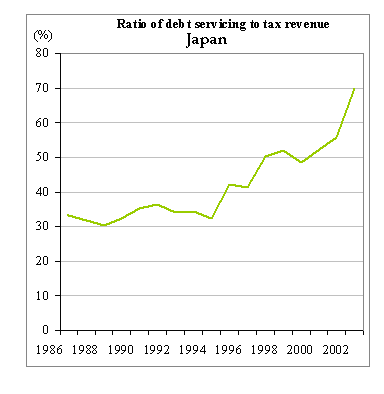 Interest rates have yet to peak, but already the buzz is about the Federal Reserve's
next round of "easing." The expectation: lowering interest rates will re-inflate the
housing bubble and thus the economy. Alas, there's a little thing called debt exhaustion
and it does not respond to dropping interest rates.
Interest rates have yet to peak, but already the buzz is about the Federal Reserve's
next round of "easing." The expectation: lowering interest rates will re-inflate the
housing bubble and thus the economy. Alas, there's a little thing called debt exhaustion
and it does not respond to dropping interest rates.
Here's why: as real estate values deflate from bubble heights, owners' ability to borrow more--at any interest rate--is severely impaired. At the same time, the government borrowing which has seemed so "affordable" during boom times now begins feeding on itself, requiring unending, massive borrowing just to pay the interest on the vast sums borrowed during "good times." While it is at best specious--if not perilous--to draw too many parallels between Japan and the U.S., it is instructive to look at what happened to Japan after its property bubble burst in 1990, and to consider if there's anything we can learn from their 15 years of decline and loss. 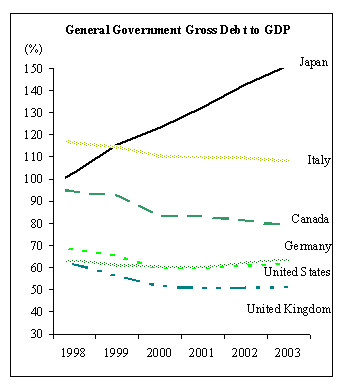 Exhibit 1 is their skyhigh public borrowing. The first chart shows that servicing
the public debt (government bonds) requires an astounding 70% of tax revenues. (This
includes the interest, overhead and bond redemptions.)
Exhibit 1 is their skyhigh public borrowing. The first chart shows that servicing
the public debt (government bonds) requires an astounding 70% of tax revenues. (This
includes the interest, overhead and bond redemptions.)
The second chart shows the debt of various developed nations as a percentage of their GDP. Japan's hovers at an unprecedented 150% of GDP. The U.S. number of about 70% looks relatively benign, but the numbers are staggering nonetheless. The U.S. paid $240 billion in interest on the national debt in this fiscal year--an expense so large that it is exceeded only by national defense, Social Security and Medicare. Not only that, but it has risen sharply from the $208 billion paid in 2005--as the debt itself grows by $250 billion per year and as interest rates rise. Here is where the stories diverge. While Japan is famously a nation of savers--and also as a nation in which savers have few options other than putting their money in low-yield government bonds or certificates of deposit (CDs)--we of course are famously profligate, a nation with negative savings. What does this mean? It means the Japanese self-funded their immense government borrowing--in other words, they saved the money and lent it to their government to fund deficit spending. Here in the U.S., we save nothing so the deficit is borrowed from foreigners. 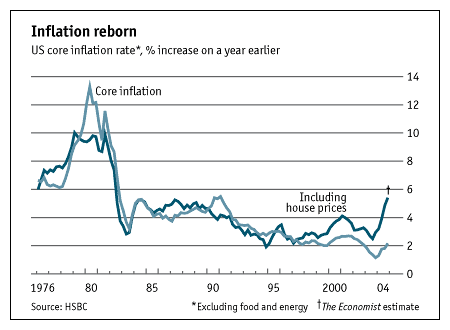 The other difference is inflation. While Japan labored under deflation--prices for
both assets and goods dropped, year after year, making the huge debts even harder to pay down--
in the U.S. inflation is rising, regardless of what the official statistics indicate.
The other difference is inflation. While Japan labored under deflation--prices for
both assets and goods dropped, year after year, making the huge debts even harder to pay down--
in the U.S. inflation is rising, regardless of what the official statistics indicate.
That means interest rates must rise, making it increasingly expensive to service debt (pay interest on outstanding debt). Here's how it works at the homeowner level. Homeowners have already indebted themselves to very near the maximum. How do we know this? Because withdrawal of equity via re-financing has withered. Why? 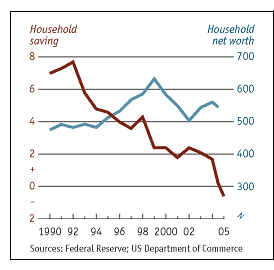 As the value of housing declines, the ability to withdraw more equity
disappears. Not only that, but middle-class households have borrowed all that their
incomes (which have been flat for years) will allow.
As the value of housing declines, the ability to withdraw more equity
disappears. Not only that, but middle-class households have borrowed all that their
incomes (which have been flat for years) will allow.
Even if interest rates drop back, fully-indebted households have neither the rising assets nor rising income to support more debt--at any price. This is debt exhaustion. Even if the Fed lowered short-term interest rates back to 1%, rising inflation guarantees that long-term rates (mortgage rates) will continue to edge higher as foreigners demand a yield at least equal to inflation. Japan is also instructive in another way. As property values plummeted from the bubble excesses, so too did the Japanese stock market. With all that equity and borrowing suddenly removed from the system, there was less money to support stock prices and company profits. 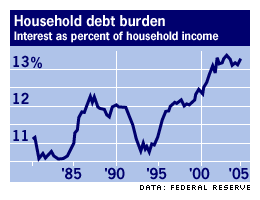 As the chart above reveals, total household wealth is doubly vulnerable--a decline in
real estate wealth will be followed by a decline in stock market wealth as the economy
slides into recession.
As the chart above reveals, total household wealth is doubly vulnerable--a decline in
real estate wealth will be followed by a decline in stock market wealth as the economy
slides into recession.
So regardless of what the Fed does, the real estate bubble cannot be re-inflated, nor can strapped households borrow more to spend spend spend in the bubble-supported consumer paradise known as the U.S. economy. This is debt exhaustion. And as tax revenues shrink in the recession, then a growing slice of whatever tax revenues remain must be spent to pay the rising interest on the government's still-growing debt, bleeding money from other government programs and from the government payrolls. It is a classic "double-whammy," and it will not vanish if short-term interest rates drop a point or two. Japan is a cautionary tale. Once housing equity dries up, households can no longer borrow more, even if interest rates drop to near zero. And even if interest rates fall, the government must borrow more to offset recession-ravaged tax revenues, creating a cycle of ever-rising debt and interest payments. For more on this subject and a wide array of other topics, please visit my weblog. copyright © 2006 Charles Hugh Smith. All rights reserved in all media. I would be honored if you linked this wEssay to your site, or printed a copy for your own use. |
||
| weblog/wEssays | home |